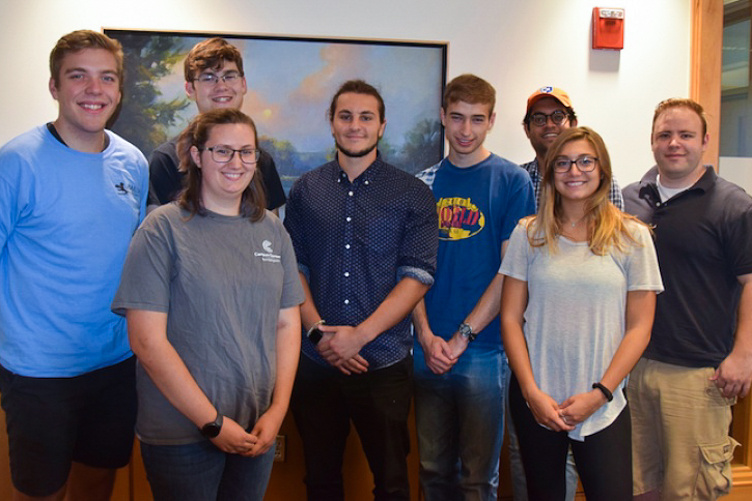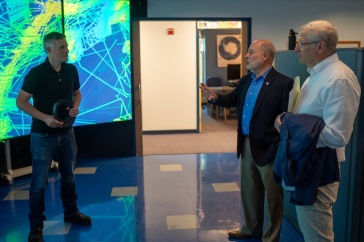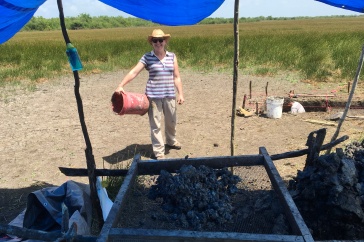
(l to r) Jake Werner ’18, Max Miller ’20, Emily MacInnis ’19, Sam Warach ’17, TJ Evarts ’20, Jit Banerjee, Savannah Passaretti-Fina ’20 and Tom Giancola ’15 were accepted to present their ideas for change at the Clinton Global Initiative University meeting taking place Oct. 13-15. (Not shown: Jill Howard ’19)
Nelson Mandela said, “Education is the most powerful weapon which you can use to change the world.” Nine UNH students are aiming to leverage that power when they attend Clinton Global Initiative University (CGI U) in October where, with more than 1,000 of their peers, they will explore solutions to, and commitments for, solving some of the world's most pressing challenges.
The 10th annual three-day meeting brings together student changemakers from more than 75 countries and 250 schools around the globe for discussions on five key areas of concern: education, the environment and climate change, peace and human rights, poverty alleviation and public health. It will be held Oct. 13-15 at Northeastern University.
The UNH teams and their projects include graduate student Jit Banerjee, Aquinput; Savannah Passaretti-Fina ’20, Project Oasis; Jacob Werner ’18, Jill Howard ’19 and Emily MacInnis ’19, Trash 2 Treasure; Sam Warach ’17, TJ Evarts ’20 and Max Miller ’20, NextStep; and graduate student Tom Giancola ’15, Village Internet.
Jit Banerjee has been working on his idea to improve conditions for shrimp farmers in Bangladesh for some time now. A master’s student in the Carsey School of Public Policy, Banerjee’s Aquinput project won the student track of the 2016 New Hampshire Social Venture Innovation Challenge.
“I happen to be from a part of the country where I can appreciate what’s happening,” says Banerjee, a native of India. “A lot of the land has been contaminated by saltwater. The rise of sea levels is making it more difficult to grow traditional crops like rice, so the farmers are looking at shrimp.”
“These nine UNH students represent some of our best and brightest students committed to using their education for positive change.”
Aquinput will provide standardization services and market access to help farmers obtain certification for their products and connect with distributors.
Savannah Passaretti-Fina grew up on a farm, making her interest in sustainable agriculture a natural one. At the Clinton Global Initiative, she’ll discuss Project OASIS (Optimizing Aquaponic Systems to Improve Sustainability), an aquaponics system designed to produce fresh vegetables and fish for a community in Costa Rica. A small-scale aquaponic system has the potential to grow food year-round in any geographical location using 90 percent less water.
“Classic agriculture is taxing on resources,” says Passaretti-Fina, a mechanical engineering major with a sustainable agriculture minor. “There is also a bind many communities run into when fertile soil and abundant water are not easily accessible. Aquaponics in a simple way is hydroponics and aquaculture combined in order to reduce water usage and waste.”

Jill Howard ’19
When Jill Howard became aware of Trash 2 Treasure, the UNH student-led waste reduction program that collects and resells furniture and dorm items discarded by students at the end of the school year, she says she was “struck by how much of an impact the organization has had in a short six years.”
“The statistics about diverting over 174 tons of waste and generating over $97,000 in revenue blew me away,” the business administration major says. “I hope the CGI U conference will provide inspiration, networking opportunities and resources for T2T to help us expand our mission and impact.”
In 2016 Sam Warach, TJ Evarts and Max Miller joined forces to develop NextStep, a web and mobile software platform aimed at helping to break the cycle of addiction by connecting people with substance abuse treatment and recovery resources. Earlier this year the team won UNH’s Holloway Prize competition for the best written business proposal.
NextStep is expected to launch Jan. 1.
Tom Giancola was one of the winners of the 2016 Social Venture Innovation Challenge community track for Village Internet, an innovative approach to rural broadband access for low income individuals.
"Right now, there are too few competitors in the broadband market, causing high prices that, in turn, are pricing low income households out of the market," says Giancola. "The lack of competition is caused by the high cost of fiber optic infrastructure (wires, poles, labor etc.). But we are leveraging wireless technology that uses existing infrastructure and converts this wired signal into blanket Wi-Fi networks at target communities."
UNH, through the Center for Social Innovation and Enterprise (CSIE), which steered the teams through the application process, has also been accepted to CGI U as a network member.
“CSIE is proud and excited to be able to facilitate UNH student participation in CGI U for the first time, and add this to our suite of innovative programs that engage students with the broader community,” says Fiona Wilson, CSIE executive director. “These nine UNH students represent some of our best and brightest students committed to using their education for positive change.”
Visit the Center for Social Innovation and Enterprise for details on the Social Innovation Challenge, Semester in the City and internships.
-
Written By:
Jody Record ’95 | Communications and Public Affairs | jody.record@unh.edu



















































